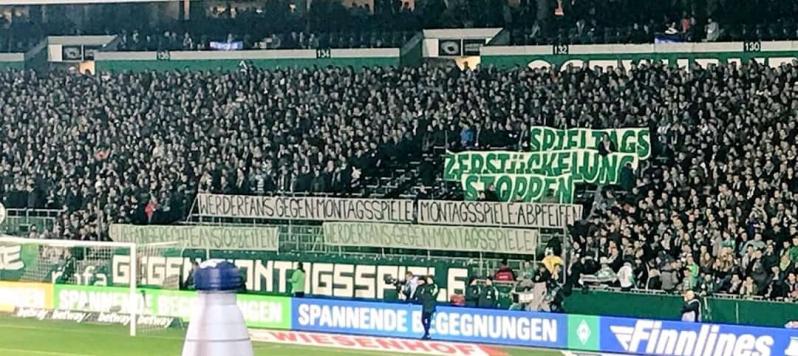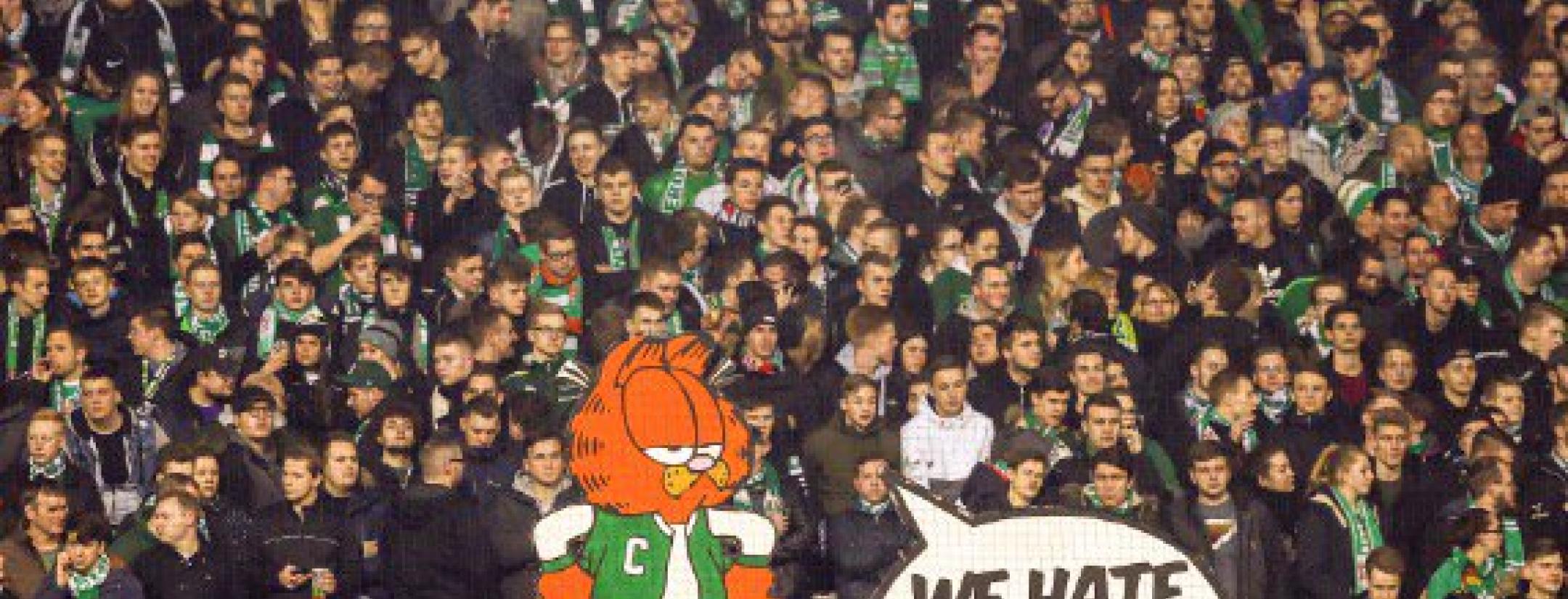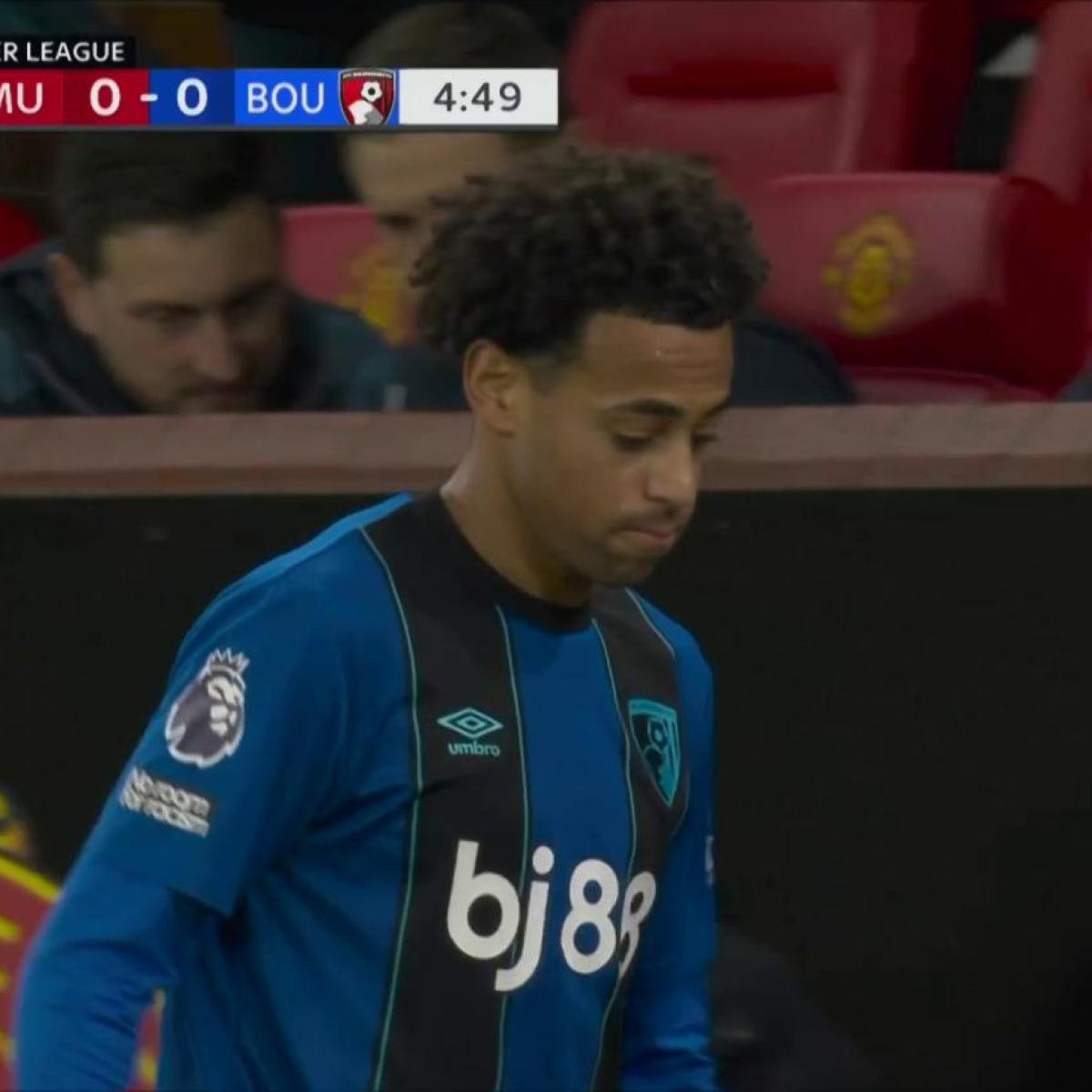Monday night football is a huge part of American sports culture, a showcase evening where the sports world focuses on whatever subpar matchup the NFL has decided everyone must watch. MNF games typically have some of the biggest TV audiences of the year, regardless of who is playing. Monday night football in Germany, on the other hand, hasn’t caught on yet, as the latest Bundesliga protests have put on full display.
Germany, it seems, is the Garfield of Europe — they hate Mondays.
Das Loch in der Mitte der #Ostkurve war nicht zu übersehen. Dort, wo sich sonst der harte Kern der #Werder-#Ultras versammelt, stand vor dem Anpfiff der Partie gegen den #effzeh niemand https://t.co/hmSDBl41j0#svwkoe pic.twitter.com/zCPLFtbFUF
— DeichStube (@DeichStube) March 12, 2018
The Bundesliga began playing league matches on Monday evenings for the first time this year. The reason is obvious: another time slot to which TV rights can be sold. But fans have repeatedly shown their displeasure in this change of schedule, protesting in a variety of methods, including tennis balls in Frankfurt, boycotts in Dortmund and, on Monday, whistles in Bremen.
Werder Bremen hosted Cologne in a meeting of two bottom-five clubs fighting to stave off relegation. Instead of yelling their lungs out in support of the Die Grün-Weißen, Bremen fans went a different route, joining recent Bundesliga protests by blowing whistles for much of the match.
The result was a match that, on TV, appeared to have a referee blowing play dead constantly. Some whistles sounded like half-time or full-time blows while others were shorter beeps as if for a foul. The effect was a match that was nearly unwatchable on TV, which was kind of the point.
In that regard, the protest had much more efficacy than that of Eintracht Frankfurt fans, who delayed a match against RB Leipzig by throwing tennis balls onto the pitch in February. It was also more noticeable than when Borussia Dortmund drew one of its smallest crowds in decades as many season-ticket holders stayed home for a Monday match with Augsburg.

Bundesliga protests continued Monday in Bremen, where fans left a sizable chunk of the supporters section empty. Photo: @Ultramaniaticos | Twitter
What these Bundesliga protests have in common is a desire to end Monday night football in Germany. But honestly they should probably just shut up.
The primary argument against Monday fixtures is that it is difficult for fans, especially of the away team, to attend the matches. Supporters, both for the home and away clubs. are the backbone of the Bundesliga, the most-watched soccer league in the world in terms of average attendance. Fans don’t like being forced to leave work early or stay up late for a return trip home after a match.
It’s an understandable argument; it’s also a bit selfish.
Monday night football isn’t anything new in Germany — 2. Bundesliga has had Friday and Monday fixtures for a while now. And yet Germany’s second division is one of the most well-attended leagues in the world, even ahead of Ligue 1, France’s first division, in average attendance. Weeknight matches are commonplace in England, whose leagues rank behind only Germany in average attendance for first and second divisions.
Yes, Monday night matches are harder for away supporters to attend, but no one is forcing fans to go to every match. If they can’t make it without leaving work early or getting home super late, then stay home. If you still want to attend, then stop complaining. But chances are, the league can make more money from selling rights to Monday matches than the clubs will lose from fans staying away.
Could this harm the atmosphere at matches with fewer away supporters in the stands? Possibly, but it doesn’t harm the product on the pitch (whistles aside) and that’s what Bundesliga wants to sell. Plus, it’s really only a handful of matches that are affected.
Bundesliga fans should look on the bright side. In the United States, it’s just about impossible for fans of any major sports team to attend every game, home and away. Teams are too spread out geographically (and MLB, NBA and NHL have far too many games). Fans in Europe are fortunate to have proximity (and public transportation) on their side for most matches, so is it really the end of the world if one or two matches a season are hard to attend?
I’m not saying Bundesliga protests shouldn’t be allowed or fans shouldn’t be heard — they definitely have that right. But I also have the right to say they should suck it up and stop ruining the show for the rest of us. The Bundesliga can make more money with Monday matches so that’s exactly what they’ll do. Unless everyone decides to stop showing up, which I highly doubt will ever happen, German fans need to just get used to the idea and find better things to do with their whistles, like cat-calling these new France jerseys.
As for the match itself, Werder Bremen won 3-1. American Aron Johanson was left on the Bremen bench but Peruvian Claudio Pizarro, who scored 143 goals in three stints with Werder Bremen, played the full 90 for Cologne.
Werder Bremen moved five points clear of the relegation playoff while Cologne stayed bottom of the 18-team league, nine points clear of safety. Given Bremen’s fans’ proclivity toward Garfield, perhaps they should sign Kevin Lasagna for a late-season push to avoid relegation.




